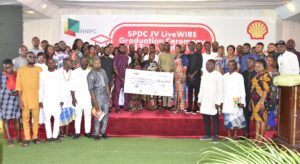
Seplat: Exceptional Q1 results despite boardroom challenges
Nigeria’s Energy Sector giant, Seplat Energy Plc, has just announced its admirable results for the first quarter of year 2023. The news, which came as a blast of fresh air completely sanitized the pungent atmosphere that was building up over the last few weeks, in respect of the surreptitious contentions against the company’s Board.
In his goodwill message to the entire staff of the organisation, the company Chairman ,Mr Basil Omiyi, thanked the staff for remaining focused in achieving the highly impressive results.
He also used the opportunity to reassure them of the unity among the Board members in ensuring the continued institutionalization of a strong corporate governance system that supports sustainable business practices as a means of delivering optimal results for the entire stakeholders, as well as the energy transition that drives social and economic prosperity for all Nigerians.
The board Chairman of Seplat Energy PLC,Mr Basil Omiyi ascended into the position in May, 2022 upon a unanimous decision by the entire Board.
The Seplat Energy board consists of highly experienced professionals and business experts with profound understanding of the dynamics of the oil and gas industry at both local and international levels.Since his appointment, he has been providing direction commensurate to the company’s strategic focus, which is to lead Nigeria’s energy transition, especially in the area of on-shore operations.
The Board seems to have bonded well and their full experience is coming to bear great fruits under the leadership of Mr Omiyi, the oil and gas industry veteran.
Specifically, compared to last year, this Q1 Y2023, the company reported a 37 per cent increase in revenue amounting to USD331 Million (despite a 16 per cent decline in oil prices); Profit After Tax increased by 189 per cent to USD57.5 million, with production averaging 51,720 barrels of oil equivalent per day (BOEP/D), which is the industry term for the measure of hydrocarbon volume (typically used for natural gas) in terms of the barrels of crude oil that would have the same energy content.
With this result, Seplat Energy’s improvements in corporate governance is set to be sustainable and enduring. This is yet to factor into the equation the prospect achievable at the full consummation of the Mobil Producing on-shore assets.
The country is surely about to witness vibrant competition in the oil and gas sector, whereby even the NNPCL will be given a run for its money, to the benefit of the Nigerian economy.
Nigeria’s leading indigenous energy company,Seplat Energy Plc listed on the Nigerian Exchange Limited (NGX: SEPLAT) and the Main Market of the London Stock Exchange (LSE: SEPL) is pursuing a Nigeria-focused growth strategy in oil and gas, as well as developing a Power & New Energy business to lead Nigeria’s energy transition.
Seplat’s energy portfolio consists of seven oil and gas blocks in the prolific Niger Delta region of Nigeria, operated in partnership with the Nigerian Government and other oil producers. Seplat also has revenue interest in OML 55, the 465MMscfd gas processing plant at Oben, in OML4, and is building the 300MMscfd ANOH Gas Processing Plant in OML53 and a new 85MMscfd gas processing plant at Sapele in OML41, to augment her position as a leading supplier of gas to the domestic power generation market. Overall, oil and gas production for the period totalled 4.7 MMboe compared to 4.3 MMboe in the same period in 2022.
Seplat Energy’s liquids (oil and condensate) operations produced 2.7 MMbbls on a working interest basis in Q1 2023 (Q1 2022: 2.6 MMbbls). Average working interest production continued to improve in Q1 2023, closing in the upper half of the guidance range (set at 45-55 kboepd) at 51,720 boepd, 8.6 per cent higher than Q1 2022 of 47,628 boepd. The split across liquids and gas was 59 per cent liquids and 41 per cent gas, as liquids grew by 4.2 per cent to 30,331 bopd (Q1 2022: 29,105 bopd) while gas grew 15.5 per cent to 124.1 MMscfd (Q1 2022: 107.4 MMscfd). The increase was largely driven by the new Oben-34 gas well coming on stream.
In addition, the use of AEP has provided a significant boost to production, adding an export route that has optimised oil and gas production from the western assets resulting in third-party downtime of 7 per cent in the period. Third-party deferment for the Group was 20 per cent, which was majorly impacted by the high deferments rate on Ohaji, mainly caused by tank top issues triggered by election restrictions at the Waltersmith refinery and the TEP outage affecting production in OML 40.
The Group’s 2023 drilling programme has 18 wells planned to arrest the decline and grow production across the assets (including non-operated assets). In the first quarter of the year, OP-17, which was accelerated into the 2022 programme and spudded in December was completed and producing at a gross rate of c.3,000 bopd. The Sibiri-2 well in OML 40 has been drilled to TD, with target reservoirs completed and currently awaiting approval to stream the well. The drilling of the remaining three wells planned for Q1 (Ovhor DMFU-03, Orogho 8, and GB-J) is ongoing and upon completion expected to produce a combined gross rate of c.4000 bopd and 20 MMscfd of gas.
Working interest gas volumes for the period were 124.1 MMscfd (9M 2021: 107.4 MMscfd). The Gas business contributed 41 per cent of the Group’s volumes on a boepd basis and 10 per cent of Group revenues. Gas sales volumes in the period were supported by the new Oben-34 well, which increased gas sales to customers. In addition, improvement in oil evacuation during the period led to a recovery in associated gas volumes.
The key investment opportunities being considered include selective entry to off-grid power generation using gas-fired generation integrated with solar and offset possibilities on a wide range of emission reduction activities in various global carbon markets. We have commenced commercial due diligence and third-party validation of the identified opportunities towards FID target of before the end of 2023.
The Safety and Responsible Operations records, which are another key performance indicator in the delivery of Seplat Energy’s strategy also recorded impressive results. The company achieved more than 3.8 million hours without Lost Time Injury (LTI) on its operated assets. Staff and contractors worked 1.9 million hours without fatalities or LTI for the period. There were 16 HSE incidents in total, compared to 23 incidents in Q1 2022. Also notable is the fact that Seplat did not recorded any spills in the first quarter. The estimated carbon intensity for her operated assets was 26.4 kgCO2/boe and the company continues to implement initiatives to bring emissions to lower levels, such as the Flares Out project. Seplat has completed a 72-hour reliability run of units 1 and 2 of the Sapele Accelerated AG solutions. The AG solution is expected to process c.26 MMscfd and will make a significant contribution to flared gas utilisation, reducing emissions and carbon intensity.
Another indicator of sustainability of this impressive growth trajectory is the fact that the Board remains confident that the transaction will be acquisition of Mobil Producing Nigeria (MPNU) on-shore assets will be fully consummated, eventually.
The company retains its working interest production guidance of 45,000 to 55,000 boepd for the rest of 2023 (which excludes any expected contribution from MPNU or ANOH) and capital expenditure for 2023 is expected to be around $160 million.



